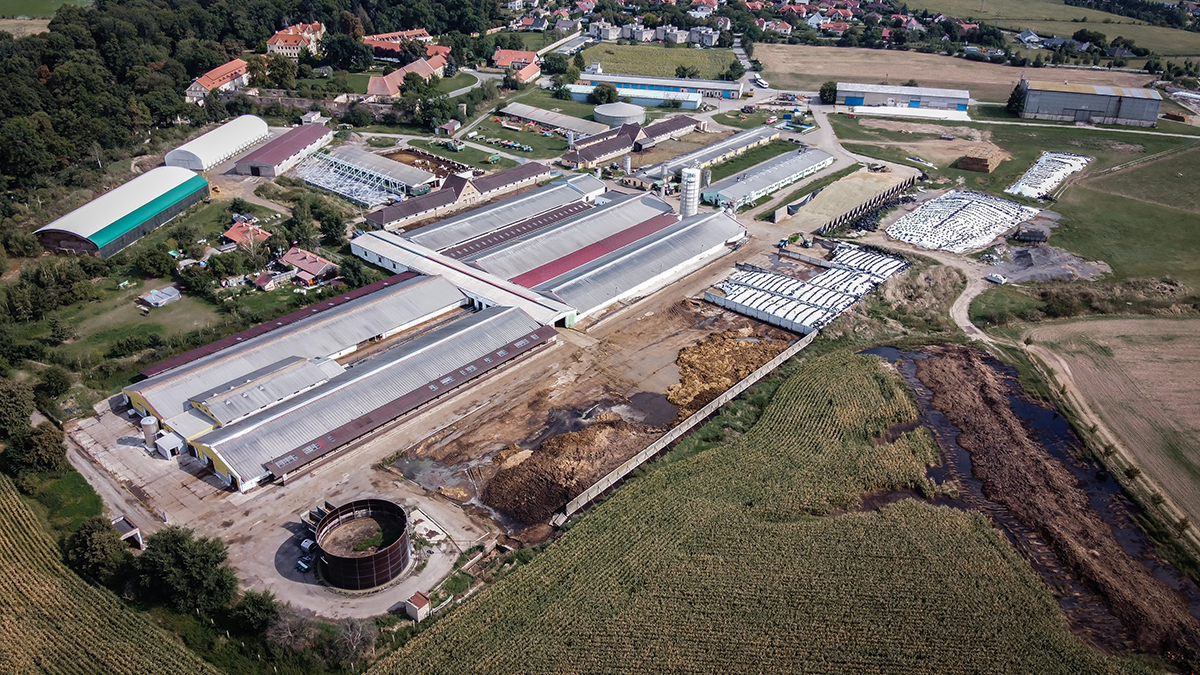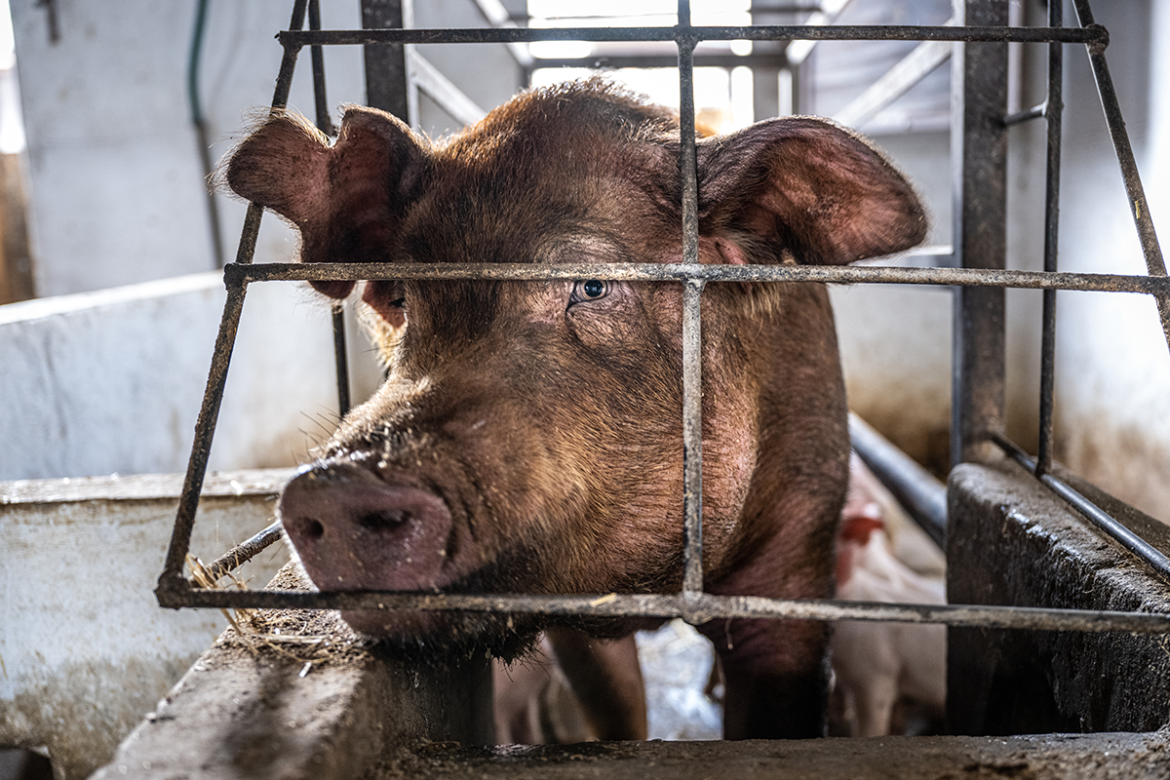Jamie Berger, filmmaker, writer, and activist, discusses The Smell of Money, a new documentary which tells the story of a North Carolina community suffering as a result of pork factory toxic waste.
Tell us about yourself and how you learnt about the injustices perpetrated by the pork industry
I was born and raised in North Carolina and, like most of us, grew up eating plenty of barbecue and not thinking twice about where it comes from. I started learning about environmental issues in high school then focused my undergraduate studies at UNC Chapel Hill on how our food system affects the environment, people, and animals. I decided to do my undergraduate honors thesis research on the NC pork industry. I explored its history in the state, its industrialization and consolidation, its corruption of the legislature, the history of labor rights organizing in the industry, and its impacts on the environment and animals as well as on residents and their health.
I was devastated and outraged to learn about how the industry was subjecting people who lived just 60 or so miles down the road from me to having untreated animal waste sprayed on their homes and land. That most of the targeted families were Black –– and had lived on their land for generations –– was even more appalling to learn. I felt like I was discovering that one of the darkest corners of America’s history was still very much alive in my home state. And I was infuriated that not only were our elected officials not addressing this problem, they were in bed with the corporations at fault and using their power to protect them.
This experience turned me into an activist and inspired me to devote my life to ending factory farming. Years later (six years ago) I was working as a video producer at a non-profit with my colleague Shawn, and we decided to make a feature documentary. I proposed this topic and was excited to reconnect with many of the people I had met through my undergrad research.
How did you go about filming this documentary?

Aerial view of a pig farm near. Photo credit: Lukas Vincour / Zvirata Nejime / We Animals Media
Our goal for the film has always been to create an impact and inspire change, so that’s the lens through which we’ve approached the entire experience. Our filming process required a lot of patience and humility; we strove to allow those most affected by this issue to tell their own stories––in their own time––in the hopes of creating a film that would resonate with audiences on a deeply human level. In exposing an industry that robs our participants of their dignity, we did our best not to replicate this harm through extractive filmmaking. We grew close with many of the people we worked with in North Carolina and have treasured their partnership throughout this process. This film has both tested and motivated us; we’ve experienced tremendous loss and grief but also so much joy and hope. More than anything, the persistence and strength of the people who shared their stories with us have motivated us to push through the sadness and anger and never give up––on this film or the fight for justice.
What do you hope the documentary will achieve?
We are under no illusion that our film alone will bring justice to communities in North Carolina––much less transform our world’s food system into one that is more just and sustainable for all. But those goals are our north star, and we hope the film will kindle a global conversation and inspire thousands of people to embrace this mission alongside us and those fighting on the frontlines. On a concrete level, we hope that advocates and organizations fighting for justice––whether environmental, social, economic, or health justice––will use the film as an education and advocacy tool to achieve their own goals. We’ve been thrilled that advocates and educators have already hosted nearly 100 impact screenings around the world, and dozens more screenings are in the works. It’s been a dream come true to see organizations use the film to drive tangible policy change, for example plant-based default policies or reforms to state-level factory farm permitting regulations. Of course, we also hope the film reaches a huge swath of the mainstream public and inspires individuals to shift toward more plant-based eating and get active in other ways, such as supporting local environmental justice organizations, speaking out for political change, or even running for office. Finally, we hope the film unites diverse groups fighting against factory farming because, as we illustrate in the movie, this is a system that harms all of us, and we will only transform it when we work together
What has the reaction been like generally? And among farming communities?
We have been overwhelmed by the reaction to our film and can confidently say that we created a movie that ignites powerful emotions such as empathy, compassion, shock, and outrage. It is a tear-jerker and gets people extremely fired up. Discussions after screenings are always lengthy and robust. Nearly all of our impact screenings have come about via word-of-mouth, so we know the film gets people talking and moving. Audiences of all kinds seem to leave with a clear feeling that what people affected by factory farms go through in North Carolina and elsewhere is simply not right. They understand that no one should endure the horrific indignity of having animal waste sprayed on their ancestral home, of breathing air or drinking water polluted with feces, or of watching their loved ones succumb to sickness and early death at the hands of a corporation that profits from their suffering. To most, the injustice of it all feels so blatant that it’s almost difficult to believe this is happening, that it’s legal. Especially in farming communities, audiences get that farmers themselves are not the enemy––that this is an issue of corporate greed, unchecked power, and government corruption. Always, viewers are eager to talk about solutions and get involved in the fight.
What role can consumers play in tackling injustice?
One clear, empowering action consumers can take right away is to withdraw our support from factory farming by refusing to buy animal products. The vast majority (99 percent) of all meat, dairy, and eggs produced in the United States come from factory farms, and this is increasingly true for most other parts of the world. So as Larry Baldwin says in the film, “if you are eating meat, you are eating CAFO-raised meat.” And most likely, you are eating meat from North Carolina, considering it is the United States’ largest poultry producing state and second-largest pork producing state––and exports these products to the UK, Europe, Asia, and around the globe. This doesn’t mean we have to go vegan overnight, but every step we can take in that direction is powerful. In my experience, the transition to veganism was easier and more delicious than I’d ever imagined. There’s power beyond our plates too. Animal ag is rooted in deeply entrenched systems like capitalism and colonialism that oppress and commodify living beings, and we can’t change these as individuals. But we can volunteer for and donate to organizations, especially Black- and brown-led groups, fighting for progress. Get politically active and run for office. Support efforts to restore democracy and break up corporate monopolies. Encourage the institutions we’re a part of––schools, universities, faith groups, businesses, etc.––to stop sourcing animal products and serve plant-based foods. Educate ourselves and others––share The Smell of Money with friends and family!
What has the reaction been like generally? And among farming communities?
We have been overwhelmed by the reaction to our film and can confidently say that we created a movie that ignites powerful emotions such as empathy, compassion, shock, and outrage. It is a tear-jerker and gets people extremely fired up. Discussions after screenings are always lengthy and robust. Nearly all of our impact screenings have come about via word-of-mouth, so we know the film gets people talking and moving. Audiences of all kinds seem to leave with a clear feeling that what people affected by factory farms go through in North Carolina and elsewhere is simply not right. They understand that no one should endure the horrific indignity of having animal waste sprayed on their ancestral home, of breathing air or drinking water polluted with feces, or of watching their loved ones succumb to sickness and early death at the hands of a corporation that profits from their suffering. To most, the injustice of it all feels so blatant that it’s almost difficult to believe this is happening, that it’s legal. Especially in farming communities, audiences get that farmers themselves are not the enemy––that this is an issue of corporate greed, unchecked power, and government corruption. Always, viewers are eager to talk about solutions and get involved in the fight.
What role can consumers play in tackling injustice?
One clear, empowering action consumers can take right away is to withdraw our support from factory farming by refusing to buy animal products. The vast majority (99 percent) of all meat, dairy, and eggs produced in the United States come from factory farms, and this is increasingly true for most other parts of the world. So as Larry Baldwin says in the film, “if you are eating meat, you are eating CAFO-raised meat.” And most likely, you are eating meat from North Carolina, considering it is the United States’ largest poultry producing state and second-largest pork producing state––and exports these products to the UK, Europe, Asia, and around the globe. This doesn’t mean we have to go vegan overnight, but every step we can take in that direction is powerful. In my experience, the transition to veganism was easier and more delicious than I’d ever imagined. There’s power beyond our plates too. Animal ag is rooted in deeply entrenched systems like capitalism and colonialism that oppress and commodify living beings, and we can’t change these as individuals. But we can volunteer for and donate to organizations, especially Black- and brown-led groups, fighting for progress. Get politically active and run for office. Support efforts to restore democracy and break up corporate monopolies. Encourage the institutions we’re a part of––schools, universities, faith groups, businesses, etc.––to stop sourcing animal products and serve plant-based foods. Educate ourselves and others––share The Smell of Money with friends and family!
Jamie Berger is a documentary filmmaker, writer, and activist born and raised in North Carolina. Her writing has been featured in Vox, The Guardian, USA Today, NowThis, The News & Observer, and more. Throughout her career, she has used writing and visual storytelling to draw attention to issues ranging from environmental racism to the climate crisis to other injustices wrought against people, animals, and the planet. The Smell of Money is her first feature-length documentary.




